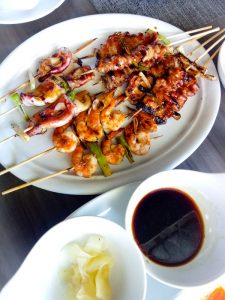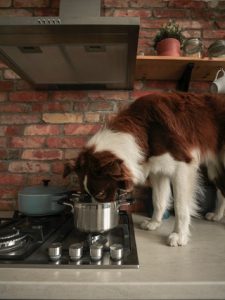It is a guilty feeling to eat a palatable dish, like the teriyaki chicken, while our furry buddy is looking at us with eyes wide open. In instances like these, we would want to give them a small bite of it but we are not sure if dogs can have teriyaki sauce. As fur parents, it is crucial to ensure that you feed your dog the correct food. Some meals are good for your fido and are nutritious, but others might be detrimental.
As we go along, let us try to find out if teriyaki foodstuff is good for them. Let’s see if a Border Collie or other dog breed can have teriyaki sauce!
What is Teriyaki Sauce?
Teriyaki is the term of a Japanese sauce that has become extremely famous in the US owing to its mild and delectable flavor. Today, a variety of teriyaki sauces plus teriyaki-inspired sauces are available in the United States, each with its unique flavor profile and additives.

Customarily, the production of the sauce is through cooking the soy sauce and mixing sugar or honey, along with cooking alcohol such as sake or mirin (an alternative option in certain recipes is wine). Afterward, condensation takes place to turn this mixture into a moderate to thick consistency by boiling and simmering it. In some circumstances, they use xylitol instead of sugar to provide a sugar-free variety of the sauce.
The use of this sauce is for marinating chicken, pork, cattle, fish, or other seafood, and even vegetables, for several hours before grilling or broiling. A dressing or drizzle sauces for fried meats including chicken and fish in some recipes are the other uses of teriyaki sauce.
The Ingredients of a Teriyaki Sauce
Soy sauce, sugar, sake, or mirin are all of the ingredients of the original teriyaki sauce. The modern-day teriyaki sauce version has a wide range of ingredients. To know which one is in it, read the product label carefully, just as you would across all other food products.
The major food corporations are masters at sneaking something into a product that would not otherwise be present. Here are two popular teriyaki sauces that can be found on nearly every store shelf. The ingredients are fairly identical, as you will note.
Teriyaki Sauce Kikkoman Brand
Teriyaki sauce from Kikkoman can be used on food that has been baked, roasted in the oven, or grilled! This delightful blend of Kikkoman’s renowned traditionally brewed soy sauce, wine, as well as spices infuses the food with flavor.
Ingredients:
- Garlic Powder
- Natural Flavors
- Onion Powder
- Salt
- Sodium Benzoate: lower than 1/10 of preservative (1%)
- Soy Sauce (Salt, Soybeans, Water, Wheat)
- Succinic Acid
- Sugar
- Vinegar
- Water
- Wine
Teriyaki Sauce Soy Vay Brand
The teriyaki sauce made by Soy Vay has a strikingly different Asian flavor profile. It is delicious as a flavorful sauce for meat, fish, tofu, or veggies. Even if you’re baking, grilling, stir-frying, or broiling, the dinner possibilities are unlimited with Soy Vay.
Ingredients:
- Dried Ginger
- Garlic
- Ginger Puree
- Onion
- Salt
- Sesame Seeds
- Soy Sauce (Salt, Soybeans, Water, Wheat)
- Sugar
- Vegetable Oil (Canola and/or Soybean)
- Water
Teriyaki Sauce Ingredients Bad for Dogs
Teriyaki sauce contains several chemicals that are toxic to dogs including the Border Collie. As you can see from the list, teriyaki sauce is not necessarily a good food for people, and it is no different when it comes to dogs.

Let’s explore some of the components that are the most dangerous to the health of your fido.
Ginger
One false claim regarding ginger is that giving it to dogs, such as the Border Collie, helps their immune systems. If you’ve ever prepared with ginger before, you’re probably aware that it has a strong flavor and aroma.
As a result, it can have a considerable impact on your pet’s gastrointestinal mucous membrane, resulting in digestive upset (primarily consisting of diarrhea and vomiting). Another side effect of teriyaki sauce or something having ginger is gastric acidity, which can make your pooch sick for a day or more.
Onion & Garlic
When it pertains to teriyaki sauce, the granules of onions and garlic are the ones to watch out for. Onions and garlic are both harmful to the Border Collie and all other dog breeds.
Onions and garlic are neurotoxins that may contribute to diarrhea, vomiting, loss of appetite, lethargy, and trouble breathing in dogs. In reality, of course, onions and garlic may cause poisoning to most animals including dogs and even cats.
These two ingredients of the teriyaki sauce are from the allium family. It contains a chemical known as N-propyl disulfide which is indigestible to dogs and cats.
Garlic has the greatest amount of this chemical, which produces oxidative injury to your dog’s red blood cells, resulting in hemolytic anemia. Depending on your dog’s breed, this might result in kidney failure or perhaps even death if left unnoticed or untreated.
Sugar
Although sugar is not lethal to Border Collies, it can create a variety of issues. Since you are concerned about how much the dog weighs, you must also keep an eye on its sugar intake. Excessive sugar can cause obesity in dog, which can decrease their lifespan as well as result in various ailments such as diabetes or even periodontal disease.

Sugar hurts the digestion of your dog and can impair many functions. It also has a detrimental effect on their skin and coat, similar to how even more sugar induces breakouts in people.
Honey, on the other hand, is safe for dogs to eat in little amounts. Untreated honey has only natural sugars as well as a variety of vitamins and minerals that are beneficial to dogs. Again, just in little quantities!
Vegetable Oils
Almost all oils, except those naturally derived like nuts and seeds (but just a few), are toxic to dogs. Since many teriyaki sauce products have canola or soy oil, they may cause hazards to dogs including the Border Collie.
Soy Sauce / Sodium
Soy sauce is a popular condiment in Asian countries such as China, Japan, the Philippines, and Korea. It can be used in a variety of cooking preparations as well as a stand-alone sauce. Soy sauce contains a variety of ingredients, the most common of which are soybeans, salt, wheat, and certain fermenting substances such as mold or yeast.
The concern behind soy sauce is it’s a rather salty condiment that is dangerous even in small amounts for people. So, you can imagine how deadly it would be for Border Collies and other dogs even through small quantities.
Soy sauce also comprises a huge content of sodium from salt, which, as you may know, is extremely dangerous to canines when consumed in large quantities. Salt poisoning, which is not only injurious but also lethal to dogs, can be caused by even more salt in their diet.
Loss of appetite, vomiting, apathy, trembling, diarrhea, seizures, urination, excessive thirst, and coma are all common signs of salt poisoning. Salt poisoning can kill your dog if there is no treatment provided.
Should Dogs Eat Teriyaki Sauce?
Teriyaki sauce is just not something you should feed to your dog. In moderation, highly processed foods like teriyaki sauce are great; the point is that people don’t consume them in moderation.
Yet, in terms of your dog, teriyaki sauce is not good for animals. If your dog eats it by accident, remain sensitive towards how they act. Once you notice your dog appears lethargic or sick, get them to the vet right away because time is tight.
How Much Teriyaki Sauce Can My Dog Eat?
Teriyaki sauce in any form is not a healthy addition to a dog’s diet. If you are asking for the amount of teriyaki sauce dogs may eat. The answer is no amount of this sauce can be eaten by Border Collies and other dogs. Even foodstuffs that have it already added to them, such as ready meals, cannot be considered less harmful.
Half a teaspoon each week might not put your dog’s life at risk, especially if they are and so a perfectly healthy adult, otherwise why take that risk at all?
What Happens If My Dog Eats Teriyaki Sauce?
Due to a myriad of factors, there could be a variety of results. The type of teriyaki sauce, for example, can have different effects depending on what it consists of xylitol or sugar.

The most common symptoms that the dog or Border Collie may face in this instance are weakness, hyperventilation, hypertension, and collapse. If the sauce contains xylitol, the dog’s blood sugar level may be severely lowered, resulting in vomiting, tremors, incoordination, or seizures.
Like what we’ve mentioned earlier, teriyaki sauce has different brands. But, as we’ve noticed, the two most common available teriyaki sauces on the market contain almost the same ingredients which have a high level of sugar and sodium.
These were some of the dangers that some of these compounds pose to your dog:
- Water loss and an electrolyte imbalance can result from consuming too much salt.
- Sugar consumption can lead to obesity and diabetes.
- Purine, a chemical found in soy sauce, can cause health problems in dogs, such as bladder crystals and kidney stones.
- Onions and garlic are poisonous to dogs and can lead to anemia if taken in excess.
- Some dogs like the Border Collie are prone to allergy. And, either soy or wheat, both of which are common ingredients in grocery teriyaki sauces, may cause hypersensitivity reactions in dogs. Indications of a dog allergy tend to involve – itching, swelling, hive, diarrhea, and vomiting, or even pink fur.
How Should You Handle Dogs Eating Teriyaki Chicken?
What will you do if your pet decides to eat your unattended food plate or a snack from the garbage? That varies on how much and what kind of teriyaki sauce your furry friend had.

Dogs eating a tiny amount of regular teriyaki sauce, such as licking the food container or snatching a small piece of chicken out from the plate is not worrisome. So, you may be able to ignore a doctor’s appointment in this case.
It is also important not to take away the teriyaki foodstuff immediately from them because it may trigger their innate dog aggressive behavior. This is especially true if your dog is a Border Collie.
However, a small to a significant amount of teriyaki sauce or teriyaki chicken will already make the dog vomit and have diarrhea. The worst is that this effect can persist up to 24 hours.
You must immediately take your beloved dog, like the Border Collie, to the local veterinarian’s clinic for treatment. Your furry friend may have to be examined for any problems or other concerns that may have resulted from the teriyaki consumption.
Also, keep in mind that any amount of teriyaki chicken or teriyaki foodstuff with xylitol as a sugar substitute is extremely dangerous to your dog. As soon as you see that your dog has eaten a sugar-free teriyaki sauce, please take them to an emergency care facility. The vet will most likely have your dog regurgitate the xylitol through induced vomiting and treat it with activated charcoal and revitalizing fluids while you’re there.
Tips to Feed a Border Collie to Avoid Unexpected Consumption of Teriyaki Sauce
If you have a Border Collie, it is important to have a plan in place for what you will feed it to retain its health. Aside from that, you will prevent your BC from getting so hungry and try to eat almost anything, even the unhealthy ones. The best diet for your Border Collie is a natural, raw diet that allows you to monitor what you feed your fido. It is based almost entirely on consuming fresh, meaty bones and food.
What matters is that you provide a well-balanced diet for your Border Collie. Raw meat, veggies, meaty bones, muscle meats, fish, and dairy items like eggs are all part of a raw diet. If you require additional supplements, like fish oil or kelp, you can do so.
Conclusion
Now because you learned that no matter how large your dog’s puppy eyes get, you must not feed teriyaki to your furry companion and look after their health. Teriyaki sauce is extremely harmful to dogs and should never be included in their diet.
Dogs should not be fed with this foodstuff since it can cause negative reactions and other health concerns to them necessitating close monitoring after intake. It is highly advisable to consult your veterinarian if you detect any changes in your pooch, such as weakness, vomiting, loss of appetite, or discomfort.


